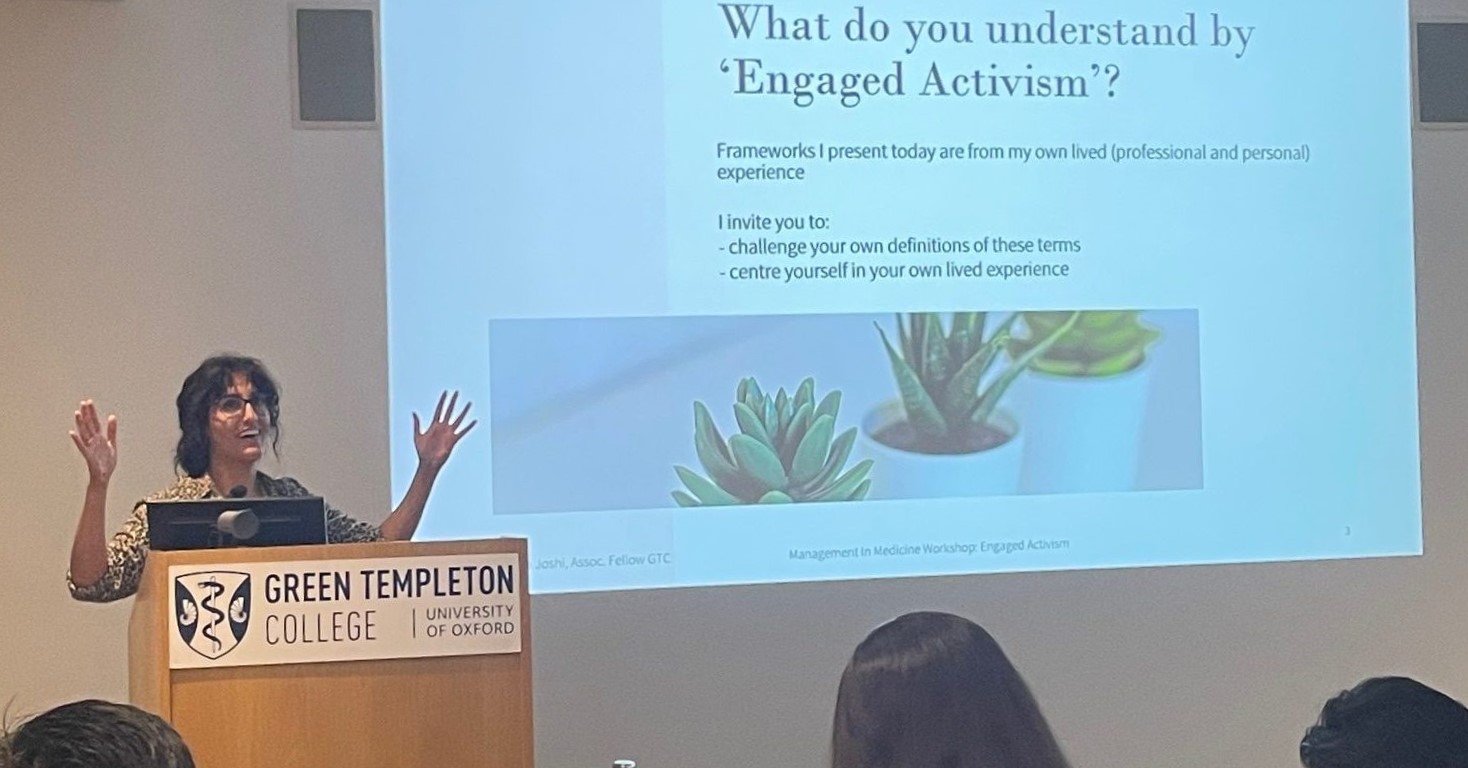Engaged Activism in Healthcare

The Management in Medicine programme at Green Templeton hosted a morning workshop on Engaged Activism on Saturday 24 May 2025.
Associate Fellow Dr Meera Joshi reflects on the event
Why did we host this workshop?
The Management in Medicine programme, accredited by the Faculty of Medical Leadership and Management, has been running for over ten years at Green Templeton College. It was created in response to the need for health systems workers to be able to thrive and lead in environments that are stressful, hierarchical and often biased. This year, the workshop on Engaged Activism was introduced to the curriculum to equip participants with skills to empower themselves in systems and environments that may have power over them.
The workshop trialled a non-didactic, lived experience-based approach to educating health systems professionals. Integrating lived-experience-based methods into healthcare professional education has demonstrated effectiveness in enhancing perceived self-empowerment, initiating change, and improving job satisfaction. This approach encourages fostering empathy, critical reflection, and a deeper understanding of individual perspectives.
What was covered?
The workshop started with an invitation to reframe the term ‘activism’. Participants were invited to create their own definitions which were shared at the end of the workshop. Rather than taking a systems-oriented approach to activism, the invitation was to centre our definition around the individual – understanding activism as action taken from a place of being fully resourced. Emphasis was placed on understanding our lived experiences not only cognitively, but by fully being within our mind-bodies. The central role of the nervous system in processing lived experience was explored. Using this as a basis for the workshop, participants then explored two key skills: perceptiveness and responsiveness.
Perceptiveness, primarily of our own experience, allows us to connect with the deeper undercurrents of our lived experience. From this repository of valuable information we are more able to take empowered action. The first step in doing so is to identify what is within our control and what is not. This allows us to discern optimal courses of action. This approach also allows us to embrace diversity within our lived experiences and acknowledge all experience as valid. The narrative thus broadens beyond that of select groups in society. (Rae Johnson, 2023)
Responsiveness was defined as the ability to perceive our environments clearly and then respond (rather than react) to this. A Nonviolent Communication (Marshall Rosenberg, 2003) based approach was introduced: identifying our needs, the needs of others we interact with and then using this information to respond to situations where we do not feel we have power. Environmental power imbalances and biases are very real, and so is the impact of these on us. By validating our experiences, including microaggressions we may not have noticed, we are more able to respond in a way that meets our needs and empowers us.
What were the outcomes?
Participants were asked to complete a validated empowerment questionnaire before and after the workshop. It measured various facets of personal empowerment including: perceived self-efficacy, sense of personal power, inclination towards community activism, internal locus of control and anger in the face of injustice. Participants at the start of the workshop had a high overall empowerment level, a strong inclination towards collaborative action, along with a high level of anger at perceived injustices in the world. Analysis of the workshop data showed:
- Improved sense of personal power and self-efficacy i.e. belief in one’s ability to affect outcomes and resist external pressures
- Average level of anger reduced by almost 20%. Could this be suggestive of an increased willingness to respond, and not react, to perceived injustices?
- Inclination towards community action and optimism towards the future remained the same (both were high to begin with)
- Overall even higher empowerment levels
Individual feedback collected from participants includes:
In medical school we learn a lot about medical conditions, examinations and so on. But the biggest challenge I’ve faced as an F1 was how to navigate the pressures that come with the job, how to work with other people and seniors, how to navigate challenges in the workplace and within myself. The skills we learned today were very helpful in that regard.
FY1 Doctor
An awakening of the individual to see what agency can look like. I enjoyed creating our definitions of activism.
Senior Lecturer in Leadership and Professional Practice
It was a wonderful workshop. The concepts of somatic psychology and not getting wound up in our storytelling were amazing. I am used to coaching and training resident doctors. I am excited to take back these ideas to what I do, I am sure it will help me improve my interactions with others. I now see activism is something I can do on a smaller scale but more effectively.
Senior GP
What next?
The Management in Medicine programme acknowledges the challenges the NHS faces at the moment: high levels of burnout, low morale and the consequential impact on workforce and health outcomes for both professionals and patients. Empowered staff are more likely to take initiative, feel satisfied with their roles, and contribute positively to organizational goals. Studies have shown that interventions aimed at increasing empowerment can lead to improvements in these areas.
Related: Beyond the Ivory Tower Series A series of events at Green Templeton College with the Oxford Global Health Society looking at healthcare leadership in a global decolonised context. You can find the associated blog here. The next event will take place in Michaelmas 2025.
A huge thanks to Green Templeton College for supporting the programme, for the administration team who ensured the workshop ran seamlessly, to Dr Nicholas Hicks for his dedication to the cause and, most of all, the participants for bringing their enthusiasm, engagement and willingness to challenge their personal status quos.
Mentioned Resources:
Johnson, R. (2023). Embodied activism: Cultivating sensuality, transforming body language, and reclaiming body image to create social change. North Atlantic Books.
Rosenberg, M. B. (2003). Nonviolent communication: A language of life (2. ed). PuddleDancer.

